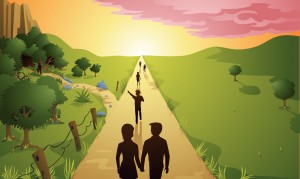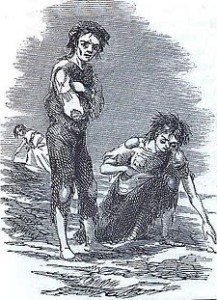Back in my youth, I had an Irish Catholic friend. She was expressive and funny, and I especially loved how her hands did much of the talking.
But she was also defensive—like a person under siege. At times she misread situations or comments as if people were out to hurt or demean her. Sometimes maybe they were. But often, I felt she viewed her circumstances through a cracked lens. If that lens had a name, it would be called, “Less Than.”
As Coldplay sings in their song “The Scientist”…
Tell me your secrets and ask me your questions,
Oh let’s go back to the start…
Last week at writer’s group, my friend Wynne read part of her manuscript on The Irish Potato Famine of 1845-1852. Potatoes were the main source of food, especially during winter months. When “the blight” destroyed the potato crop season after season, poor families were affected the most. The famine led to mass starvation, disease and emigration. The heart-wrenching story affected me as some of my Scottish ancestors lived in Ireland at that time.
Ireland still produced enough food to feed its own people, but the ruling British exported Irish crops for their own use—causing some historians to call the tragedy a genocide.
English writer, John Mitchel exposed their greed saying the Irish watched their “food melting in rottenness off the face of the earth,” as “heavy-laden ships, freighted with the yellow corn their own hands (had) sown and reaped, spreading sail for England.”
And his most famous line: “The Almighty, indeed, sent the potato blight, but the English created the Famine.” The subject is still controversial today.
Leading up to this time, Irish Catholics were particularly singled out. Catholics made up 80% of the population, and most lived in poverty and insecurity. They were not allowed to purchase or lease land, vote, hold political office or even live within five miles of a town. They were also restricted from getting an education, entering a profession and other essential things that allow success in life. During the famine years, 1 million people starved or died from disease, and another million or more fled to other countries.
In America, their lives proved equally as difficult. They fell to the lowest rung of society, taking menial jobs to survive daily. Employers abused them and landlords used them. Horrific injustices were pervasive beyond belief.
Gregory Boyle in his moving book, Tattoos on the Heart, said, “Shame is feeling bad about oneself. Failure, embarrassment, weakness, overwhelming worthlessness and feeling disgracefully ‘less than’—permeates the marrow of the soul. Part of the spirit dies a little each time it’s asked to carry more than its weight in terror, violence and betrayal.”
Is it any wonder that generational wounds this deep still manifest in Irish people today? I understood my friend’s defensiveness and negativity with new eyes. People who’ve been branded as “less than” need to discover that God’s banner over them is love and acceptance.
One night, God gave me a vivid dream about my friend: She sat cross-legged on the floor of her house with a large Bible open on her lap. It seemed she’d been reading for a while by candlelight. I was not in the dream but saw the scene as an observer.
 All at once I noticed a long steady stream of people walking single file, up the long road to her house. I could see them coming from miles away, as if they’d journeyed great distances and even traveled from ages past.
All at once I noticed a long steady stream of people walking single file, up the long road to her house. I could see them coming from miles away, as if they’d journeyed great distances and even traveled from ages past.
One by one, they entered her home, waiting their turn. Because she sat on the floor, each person dropped on bended knee to speak with her—face-to-face, eye-to-eye.
They came to apologize.
My friend wept a torrent of tears. She touched their hands and patted their shoulders. “It’s okay,” she whispered. “You didn’t know.” Though wrongful acts are never okay, it reminded me of Jesus’ words on the cross—“Father forgive them, for they don’t know what they do.”
The line of people went on and on…endlessly into the horizon.
I wish this scene of repentance and forgiveness could really happen for my friend, but also for many people. Think of the persecution and oppression toward countless people groups throughout human history. Pastor and teacher, Rick Joyner, said that most people sitting in counseling offices either need to forgive someone, or be forgiven.
 In life as in the dream, it starts with receiving the truth from Scripture—that we are fully loved and forgiven by God. And because of that, He unequivocally asks us to forgive others. In the Lord’s Prayer, the word “as” is critical: Forgive us AS we forgive others.
In life as in the dream, it starts with receiving the truth from Scripture—that we are fully loved and forgiven by God. And because of that, He unequivocally asks us to forgive others. In the Lord’s Prayer, the word “as” is critical: Forgive us AS we forgive others.
All this portrayed in the symbolism of a simple dream. And my friend’s tears served as a baptism into a new way of life—a life without a cracked lens.
In Coldplay’s words…
Come up to meet you, tell you I’m sorry
You don’t know how lovely you are…
No one said it was easy…
_________________________
http://en.wikipedia.org/wiki/Great_Famine_(Ireland)
http://www.historyplace.com/worldhistory/famine/
http://www.amazon.com/Tattoos-Heart-Power-Boundless-Compassion/dp/1439153159
Coldplay’s “The Scientist” www.youtube.com/watch?v=RB-RcX5DS5A











the reality of what jesus stresses about forgiveness is stark and instructive and beautiful. that ‘AS’ word is filled with power like the atom bomb in my opinion! and it’s a clue, a principle we cannot ignore. it’s huge. i love principles in the word because when put into play, it’s the coolest thing to watch god’s hand show up in the seen world. that, for me, is the highest high.
love
suzee B
Suzee—I couldn’t agree more. Don’t you wonder what it would look like if we could see what happens when we forgive? I think it would be a light show like no other!
Had a dream about a ship out on the ocean and heard a comment that there is strength on the leeward side .